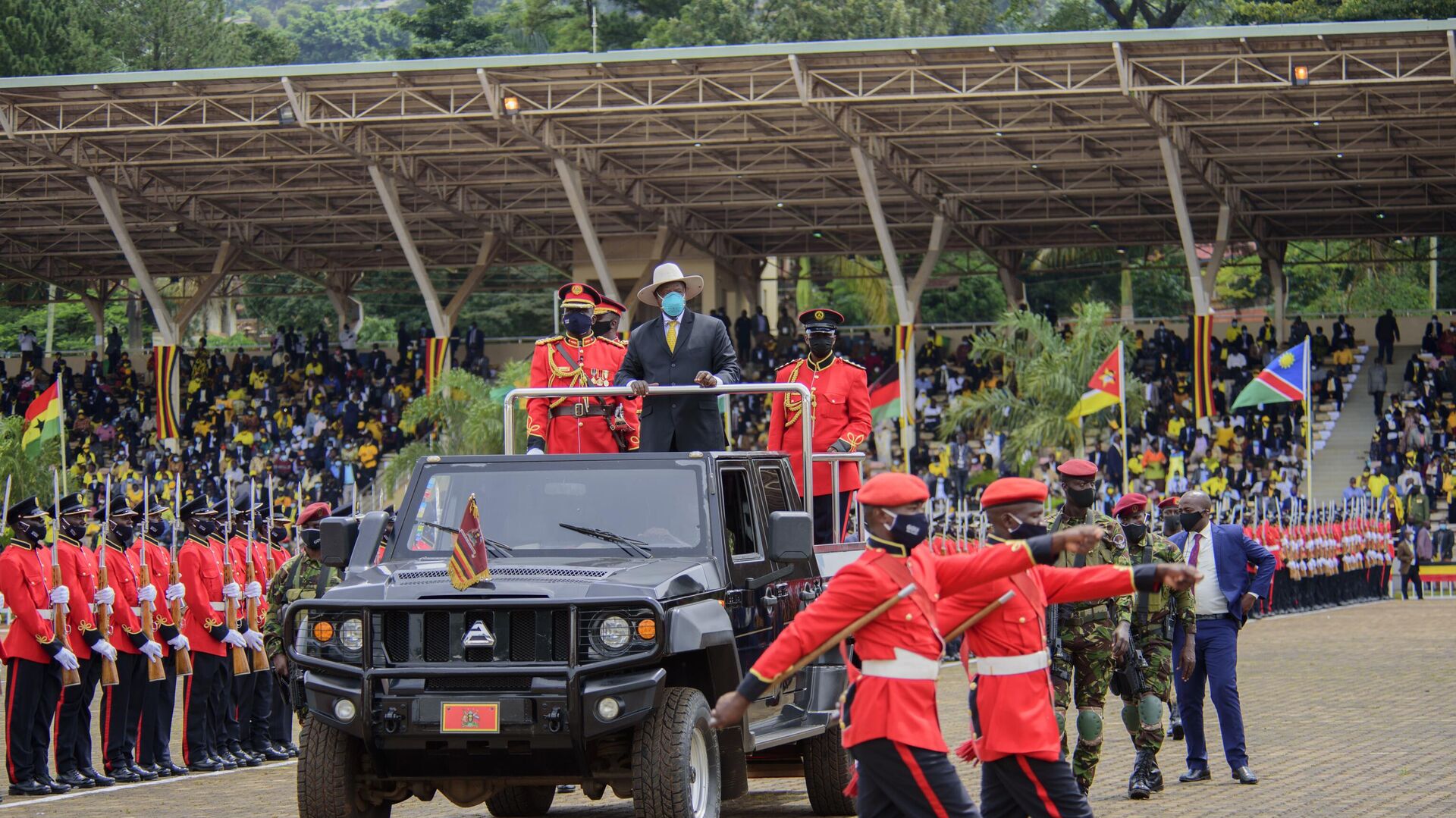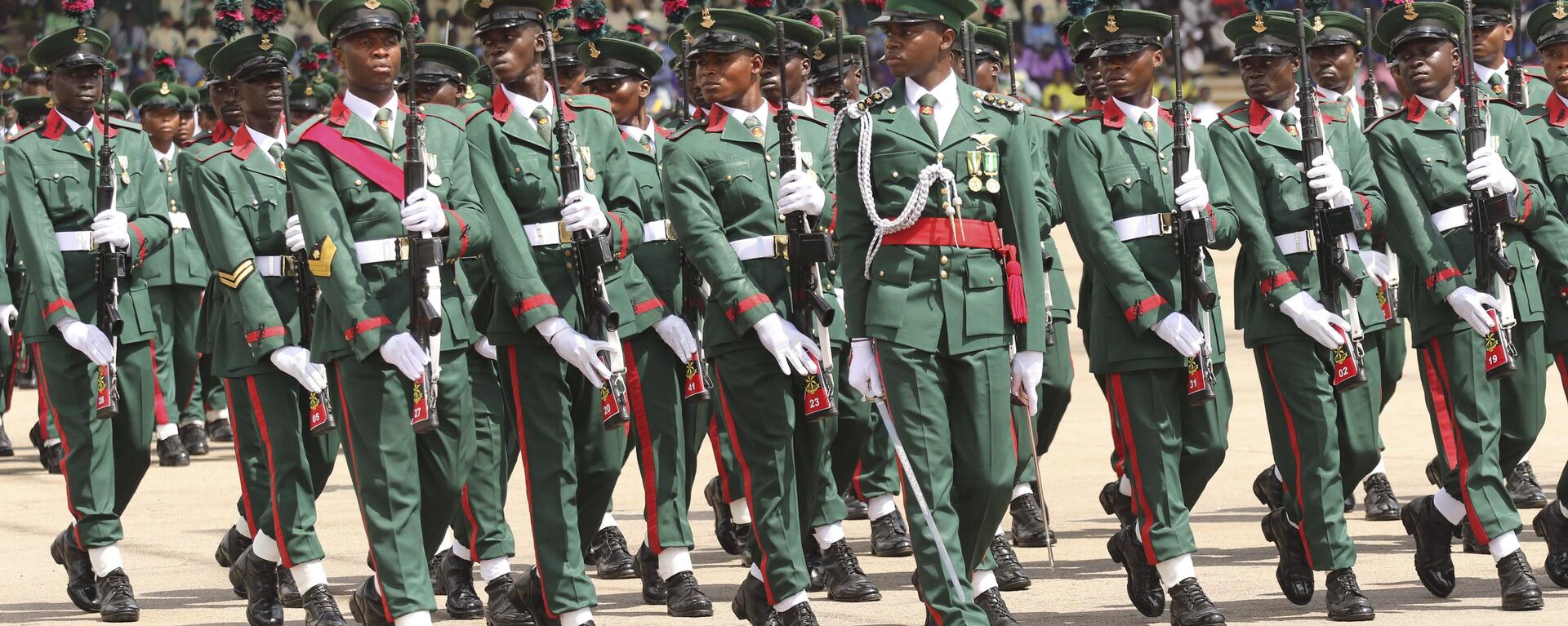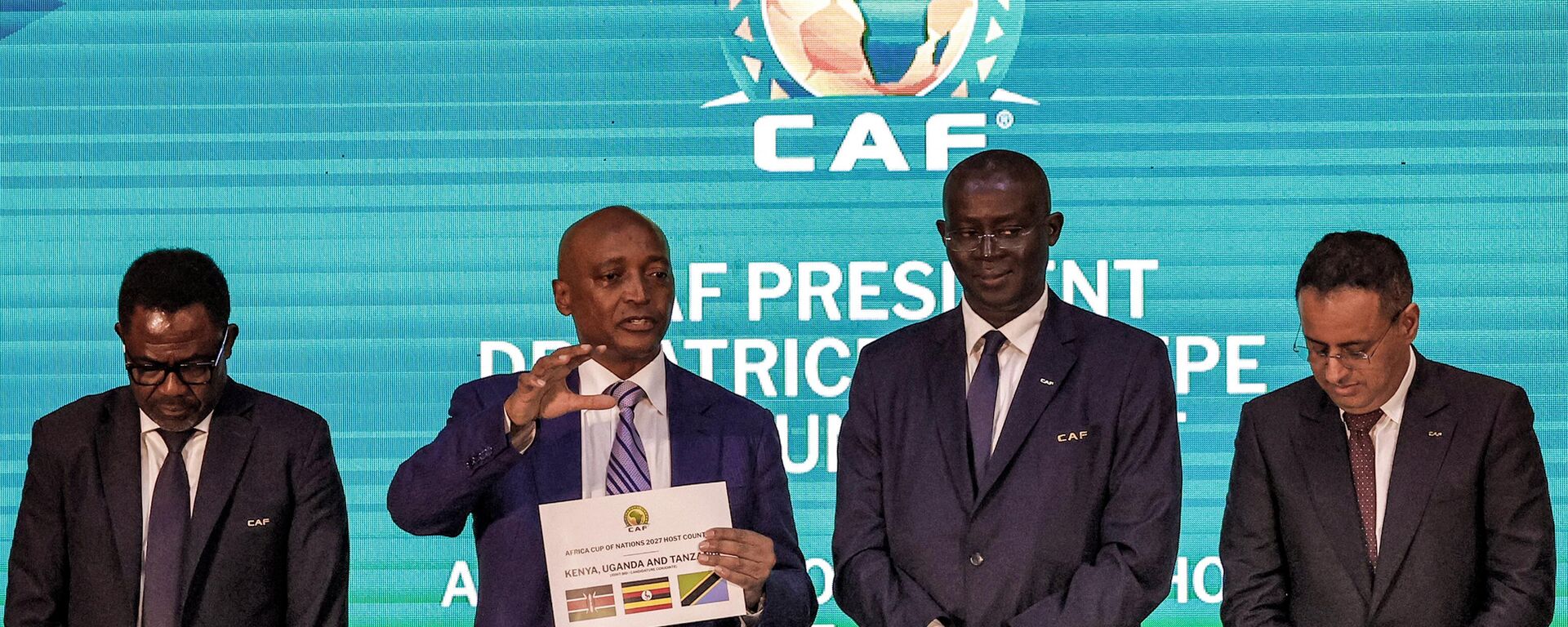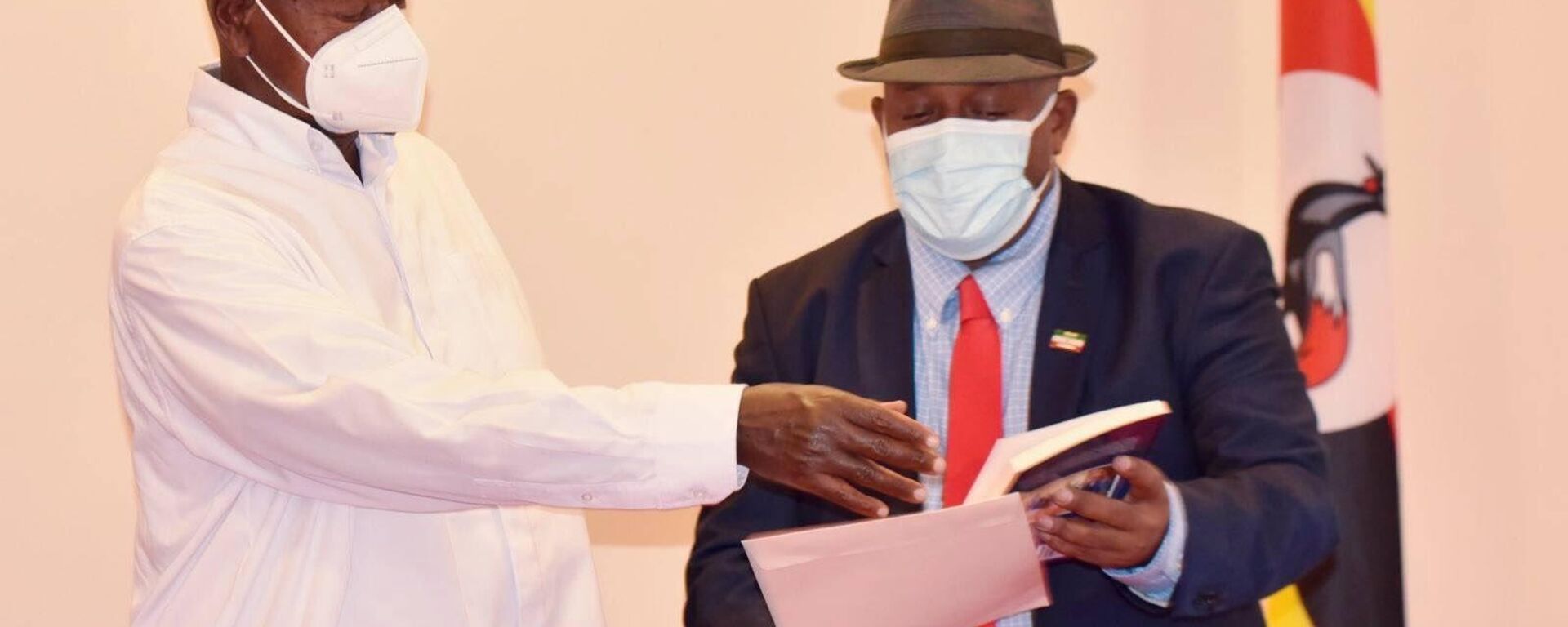https://en.sputniknews.africa/20231009/museveni-urges-ugandans-to-embrace-patriotism-pan-africanism-as-nation-celebrates-independence-day-1062653581.html
Museveni Urges Ugandans to Embrace Patriotism, Pan-Africanism as Nation Celebrates Independence Day
Museveni Urges Ugandans to Embrace Patriotism, Pan-Africanism as Nation Celebrates Independence Day
Sputnik Africa
Uganda, known as "the pearl of Africa", celebrated its 61st Independence Day on Monday, October 9, with various activities and events across the country. The... 09.10.2023, Sputnik Africa
2023-10-09T15:50+0200
2023-10-09T15:50+0200
2023-10-09T15:50+0200
sub-saharan africa
uganda
independence
british colonialism
colonialism
east africa
yoweri museveni
hassan sheikh mohamud
united kingdom (uk)
national holiday
https://cdn1.img.sputniknews.africa/img/07e7/0a/09/1062655721_0:0:3067:1725_1920x0_80_0_0_7c8e75270c7bbebf40bc579f3dfd620f.jpg
The main event of Uganda's 61st independence anniversary celebrations was the formal national parade at the Kololo Ceremonial Grounds in the capital, Kampala, where President Museveni delivered a speech and inspected the troops. The Ugandan leader also awarded medals to some of the distinguished citizens who have contributed to the development and security of the nation.The President reiterated his government's principles of patriotism and Pan-Africanism and rejected the politics of identity based on religion, tribe or gender. He said the politics of interests based on the needs of the people (food, jobs, market, etc.) is the way to ensure economic and social prosperity for Uganda and Africa.The Ugandan president highlighted the country's achievements over the past 60 years, including restoring peace and security, building infrastructure, developing agriculture and industry, expanding education and health services, empowering women and youth, and fighting corruption and sectarianism.Museveni outlined the challenges and opportunities facing Uganda today and in the future, including climate change, population growth, regional integration, digital transformation and global competition. He urged the people to embrace science and technology, innovation and creativity, hard work and discipline, and patriotism and Pan-Africanism to meet these challenges and seize these opportunities.The Head of State thanked the people of Uganda for their support and confidence in him and his government.Museveni also thanked the heads of state and other dignitaries who attended or sent messages of congratulations to Uganda on its Independence Day. Some of the guests included Prosper Bazombanza, the Vice President of the Republic of Burundi, and Sheikh Shakhboot Nahyan Al Nahyan, the Minister of State for Foreign Affairs of the United Arab Emirates (UAE).The parade also featured cultural performances, music and dances from different regions and ethnic groups of Uganda. The colorful costumes and traditional instruments showcased the diversity and richness of Uganda's culture.The celebrations also included fireworks, concerts, sports and entertainment events in various parts of the country.Uganda's Struggle for IndependenceUganda became a British protectorate in 1894 and was ruled by the British until 1962. In the pre-colonial era, Uganda had five kingdoms within its territory with varying degrees of autonomy and influence, with the Buganda Kingdom being the largest and most powerful.The origins of Uganda's struggle for independence began in the 1940s, when Ugandans staged various demonstrations against the colonial rule, mainly against economic exploitation. They objected to the manipulative pricing of their cash crops, which did not bring the benefits they deserved.Francis Semakula Mulumba was one of the first leaders to call for Uganda's independence in 1947. He sought diplomatic support from the Soviet Union and other countries for the independence of Uganda, Kenya, and Tanganyika.In 1955, the British government announced a plan to grant Uganda self-government within the Commonwealth of Nations. This sparked a constitutional crisis, as the kingdom of Buganda demanded more autonomy and threatened to secede.In 1960, the British government convened a constitutional conference in London, where representatives of Uganda's various political parties and regions agreed on a federal system of government with a bicameral legislature and a prime minister.Two general elections were held in Uganda in 1961. The first, in March, was boycotted by the Buganda Kingdom and its allies. The second, in April, was participated in by all parties. The Uganda People's Congress (UPC), led by Milton Obote, won the majority of seats in both elections and formed a coalition government with the Kabaka Yekka (KY) party, which represented the Buganda kingdom.As of the present time, Uganda is one of the fastest-growing economies in Africa, with an average annual growth rate of about 6% in the past decade. It has a population of about 45 million people, of which more than half are under the age of 18. It has abundant natural resources, such as fertile land, water, minerals, and wildlife.Uganda is also a key player in regional and continental affairs as a member of the East African Community, the African Union, the Commonwealth of Nations, and the United Nations. The East African nation has contributed to the peace and stability of its neighbors in the Horn of Africa, such as Somalia, South Sudan, and the Democratic Republic of Congo.
https://en.sputniknews.africa/20231001/courage-compassion-and-commitment-nigeria-celebrates-63-years-of-independence-1062471823.html
https://en.sputniknews.africa/20230927/east-african-leaders-rejoice-after-successful-afcon-bid-1062397200.html
https://en.sputniknews.africa/20230923/ugandas-president-offers-mediation-in-somali--somaliland-reunification-1062298944.html
uganda
east africa
united kingdom (uk)
Sputnik Africa
feedback@sputniknews.com
+74956456601
MIA „Rossiya Segodnya“
2023
Muhammad Nooh Osman
https://cdn1.img.sputniknews.africa/img/07e7/04/0a/1058467512_0:0:1280:1280_100x100_80_0_0_ec723833bcbfcaed2e21952965ad99e4.jpg
Muhammad Nooh Osman
https://cdn1.img.sputniknews.africa/img/07e7/04/0a/1058467512_0:0:1280:1280_100x100_80_0_0_ec723833bcbfcaed2e21952965ad99e4.jpg
News
en_EN
Sputnik Africa
feedback@sputniknews.com
+74956456601
MIA „Rossiya Segodnya“
Sputnik Africa
feedback@sputniknews.com
+74956456601
MIA „Rossiya Segodnya“
Muhammad Nooh Osman
https://cdn1.img.sputniknews.africa/img/07e7/04/0a/1058467512_0:0:1280:1280_100x100_80_0_0_ec723833bcbfcaed2e21952965ad99e4.jpg
uganda, independence, british colonialism, colonialism, east africa, yoweri museveni, hassan sheikh mohamud, united kingdom (uk), national holiday
uganda, independence, british colonialism, colonialism, east africa, yoweri museveni, hassan sheikh mohamud, united kingdom (uk), national holiday
Museveni Urges Ugandans to Embrace Patriotism, Pan-Africanism as Nation Celebrates Independence Day
Muhammad Nooh Osman
Writer/Editor
Uganda, known as "the pearl of Africa", celebrated its 61st Independence Day on Monday, October 9, with various activities and events across the country. The day commemorates Uganda's liberation from the British colonial rule in 1962, after a long and complex struggle that involved various political, social, and economic factors.
The main event of Uganda's 61st
independence anniversary celebrations was the formal national parade at the Kololo Ceremonial Grounds in the capital, Kampala, where President Museveni delivered a speech and inspected the troops. The Ugandan leader also awarded medals to some of the distinguished citizens who have contributed to the development and security of the nation.
The President reiterated his government's principles of patriotism and Pan-Africanism and rejected the
politics of identity based on religion, tribe or gender. He said the politics of interests based on the needs of the people (food, jobs, market, etc.) is the way to ensure economic and social prosperity for Uganda and Africa.
"We reject the pseudo-ideology of emphasizing the politics of identity and we emphasize the politics of interests. While we recognize and respect the respective identities of our People (religion, tribes, gender), we insist that, in order to ensure the economic and social prosperity of our People, we must not forget their needs," Museveni said in a Monday speech.
The Ugandan president highlighted the country's achievements over the past 60 years, including restoring peace and security, building infrastructure, developing agriculture and industry, expanding education and health services, empowering women and youth, and fighting corruption and sectarianism.
Museveni outlined the challenges and opportunities facing Uganda today and in the future, including climate change, population growth, regional integration, digital transformation and global competition. He urged the people to embrace science and technology, innovation and creativity, hard work and discipline, and patriotism and
Pan-Africanism to meet these challenges and seize these opportunities.
The Head of State thanked the people of Uganda for their support and confidence in him and his government.
Museveni also thanked the heads of state and other dignitaries who attended or sent messages of congratulations to Uganda on its Independence Day. Some of the guests included Prosper Bazombanza, the Vice President of the Republic of Burundi, and Sheikh Shakhboot Nahyan Al Nahyan, the Minister of State for Foreign Affairs of the United Arab Emirates (UAE).
The parade also featured cultural performances, music and dances from different regions and ethnic groups of Uganda. The colorful costumes and traditional instruments showcased the diversity and richness of Uganda's culture.
The celebrations also included fireworks, concerts, sports and entertainment events in various parts of the country.
Uganda's Struggle for Independence
Uganda became a British protectorate in 1894 and was ruled by the British until 1962. In the pre-colonial era, Uganda had five kingdoms within its territory with varying degrees of autonomy and influence, with the Buganda Kingdom being the largest and most powerful.
The origins of Uganda's struggle for independence began in the 1940s, when Ugandans staged various demonstrations against the colonial rule, mainly against economic exploitation. They objected to the manipulative pricing of their cash crops, which did not bring the benefits they deserved.
Francis Semakula Mulumba was one of the first leaders to call for Uganda's independence in 1947. He sought diplomatic support from the Soviet Union and other countries for the independence of Uganda, Kenya, and Tanganyika.
In 1955, the British government announced a plan to grant Uganda self-government within the Commonwealth of Nations. This sparked a constitutional crisis, as the kingdom of Buganda demanded more autonomy and threatened to secede.
In 1960, the British government convened a constitutional conference in London, where representatives of Uganda's various political parties and regions agreed on a federal system of government with a bicameral legislature and a prime minister.
Two general elections were held in Uganda in 1961. The first, in March, was boycotted by the Buganda Kingdom and its allies. The second, in April, was participated in by all parties. The Uganda People's Congress (UPC), led by Milton Obote, won the majority of seats in both elections and formed a coalition government with the Kabaka Yekka (KY) party, which represented the Buganda kingdom.
On October 9, 1962, Uganda became an independent sovereign state within the Commonwealth of Nations. The British monarch, Elizabeth II, remained the nominal head of state as Queen of Uganda until October 9, 1963, when Uganda became a republic with Mutesa II as its first president and Obote as prime minister.
As of the present time, Uganda is one of the
fastest-growing economies in Africa, with an average annual growth rate of about 6% in the past decade. It has a population of about 45 million people, of which more than half are under the age of 18. It has abundant natural resources, such as fertile land, water, minerals, and wildlife.
Uganda is also a key player in regional and continental affairs as a member of the East African Community, the African Union, the Commonwealth of Nations, and the United Nations. The East African nation has contributed to the peace and
stability of its neighbors in the Horn of Africa, such as Somalia, South Sudan, and the Democratic Republic of Congo.





